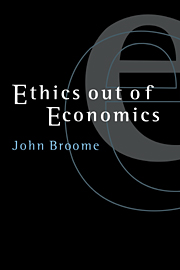Book contents
- Frontmatter
- Contents
- Preface
- 1 Introduction: ethics out of economics
- Part I Preference and value
- Part II The structure of good
- 6 Bolker–Jeffrey expected utility theory and axiomatic utilitarianism
- 7 Fairness
- 8 Is incommensurability vagueness?
- 9 Incommensurable values
- 10 Goodness is reducible to betterness: the evil of death is the value of life
- Part III The value of life
- Notes
- Bibliography
- Index
7 - Fairness
Published online by Cambridge University Press: 12 November 2009
- Frontmatter
- Contents
- Preface
- 1 Introduction: ethics out of economics
- Part I Preference and value
- Part II The structure of good
- 6 Bolker–Jeffrey expected utility theory and axiomatic utilitarianism
- 7 Fairness
- 8 Is incommensurability vagueness?
- 9 Incommensurable values
- 10 Goodness is reducible to betterness: the evil of death is the value of life
- Part III The value of life
- Notes
- Bibliography
- Index
Summary
This chapter presents a theory about fairness, as it applies to the distribution of goods between people. I shall concentrate particularly on random lotteries. Sometimes a lottery is the fairest way of distributing a good, and my theory explains, better than any other theory I know, why this is so. That is the main evidence I offer for it. But the theory is not limited to lotteries; it is intended to apply whenever goods are distributed between people. I shall use the fairness of lotteries as a guide to fairness in general.
Choosing between candidates
It often happens that there are several candidates to receive a good, but the good cannot be divided up to go round them all. The good may be very important; it may even amount to the saving of the candidate's life. For instance, not enough kidneys are available for transplant for everyone who needs one. As a result, some people are denied treatment for their kidney failure, and consequently die.
For each candidate, there will be reasons why she should have the good, or some of it. (I mean prima facie reasons, which may be defeated by other reasons.) Amongst them will be the benefits, to the candidate herself and to other people, that will result from this candidate's receiving the good. When the good is the saving of life, these benefits will depend on how much the candidate enjoys her life, what responsibilities she has to other people, and so on. Then there may also be other reasons. One may be desert: some of the candidates may deserve the good, perhaps because of services they have performed in the past. For the moment, suppose all these reasons can be weighed against each other.
- Type
- Chapter
- Information
- Ethics out of Economics , pp. 111 - 122Publisher: Cambridge University PressPrint publication year: 1999
- 13
- Cited by



